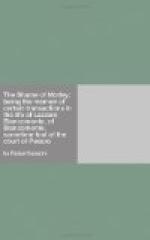“I will not leave you, sir,” she vowed; and it was good to hear her.
“Indeed, I hope you may not know the need,” I answered wearily. And thus we started on once more.
Sant’ Iddio! What agonies I suffered ere the sun rose up out of the sea to flood us with his winter glory! What agonies were mine during those two hours or so of that last stage of our eventful journey! “I must bear up until we are at the gates of Pesaro,” I kept murmuring to myself, and, as if my spirit were inclined to become the servant of my will and hold my battered flesh alive until we got that far, Pesaro’s gates I had the joy of entering ere I was constrained to give way.
Dimly I remember—for very dim were my perceptions growing—that as we crossed the bridge and passed beneath the archway of the Porta Romana, the officer turned out to see who came. At sight of me be gaped a moment in astonishment.
“Boccadoro?” he exclaimed, at last. “So soon returned?”
“Like Perseus from the rescue of Andromeda,” answered I, in a feeble voice, “saving that Perseus was less bloody than am I. Behold the Madonna Paola Sforza di Santafior, the noble cousin of our High and Mighty Lord.”
And then as if my task being done, I were free to set my weary brain to rest, my senses grew confused, the officer’s voice became a hum that gradually waxed fainter as I sank into what seemed the most luxurious and delicious sleep that ever mortal knew.
Two days later, when I was conscious once more, I learned what excitement those words of mine had sown, with what honours Madonna Paola was escorted to the Castle, and how the citizens of Pesaro turned out upon hearing the news which ran like fire before us. And Madonna, it seems, had loudly proclaimed how gallantly I had served her, for as they bore me along in a cloak carried by four men-at-arms, the cry that was heard in the streets of Pesaro that morning was “Boccadoro!” They had loved me, had those good citizens of Pesaro, and the news of my departure had cast a gloom upon the town. To have their hero return in a manner so truly heroic provoked that brave display of their affection, and I deeply doubt if ever in the days of greatest loyalty the name of Sforza was as loudly cried in Pesaro as, they tell me, was the name of Sforza’s Fool that day.
CHAPTER VII
THE SUMMONS FROM ROME
If Madonna Paola did not achieve quite all that she had promised me so readily, yet she achieved more than from my acquaintance with the nature of Giovanni Sforza—and my knowledge of the deep malice he entertained for me—I should have dared to hope.




